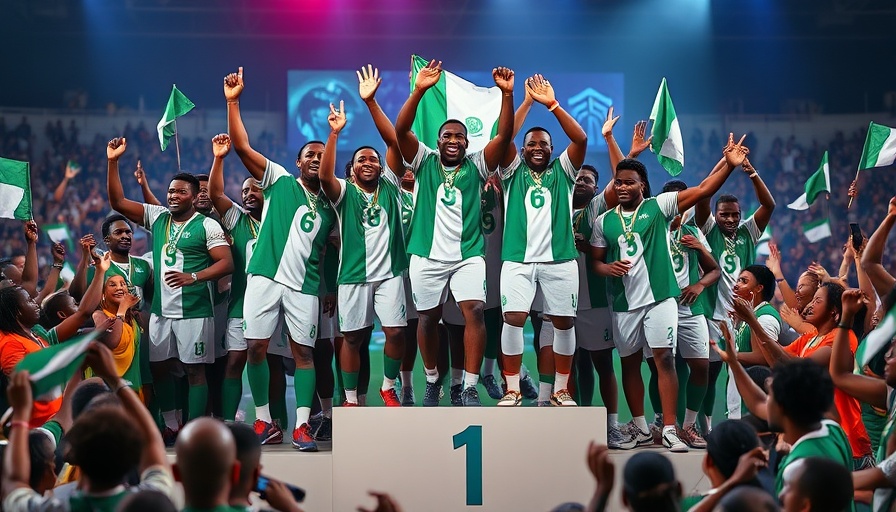
Nigeria has made waves in the sports arena, marking a historic moment for flag football as both its men's and women's teams secured gold medals at the 2025 IFAF Africa Flag Football Championships in Cairo, Egypt. This unprecedented achievement makes Nigeria the first African nation to claim gold in both categories, illustrating not just the country's athletic prowess but also the potential for growth in American football on the continent.
The video 'Nigeria Makes History with Double Gold at Africa Flag Football Championship' highlights the monumental success of Nigeria's teams, prompting a deeper exploration of this significant event.
The Historic Triumph of Nigeria’s Flag Football Teams
Over the weekend, the excitement surrounding the championship was palpable, as the Nigerian teams exhibited exceptional performance, dominating their competitors. The women's team, in particular, showed character and excellence throughout the tournament, paving the way for a final clash that saw them emerging victorious. The men’s team not only followed suit with their own dazzling displays but did so in a manner that enthralled spectators and fans alike.
This success is being heralded as a landmark moment for the Nigerian American Football Association (NAFA), which has worked tirelessly since its inception in 2019 to foster the growth of the sport within Nigeria. After their triumphant return home, the teams were warmly welcomed by the National Sports Commission, thereby spotlighting the cultural significance this sporting event has for national pride and unity.
Building on a Historic Foundation: The Future of Flag Football in Nigeria
Following the championships, questions regarding sustainability and future growth in flag football arose. Babaj Aerolu, president of NAFA, articulated the need for continued investment and strategic planning to nurture young talent. The sport’s trajectory in Nigeria must evolve; currently, American football training begins at a very young age in the U.S., something that is still nascent in Nigeria.
One of the fundamental approaches NAFA is adopting moving forward is establishing a robust pipeline—one that supports players from a young age through to adult competition. Initiatives are already underway to engage younger children and incorporate American football fundamentals into national youth sports programs. This forward-thinking approach not only dreams big but also prepares the next generation for international stages.
Social Implications and the Role of Flag Football in Nigeria
Flag football, as showcased through Nigeria's recent success, transcends the boundaries of sport. It fosters community, engagement, and can serve as a powerful tool for societal development. The widespread recognition garnered through their performance helps elevate not only the profile of flag football but also serves to inspire future athletes that success is achievable.
Moreover, the visibility these teams have gained could motivate sponsors and partners to invest in grassroots initiatives, ultimately creating a more vibrant sporting culture in Nigeria. As the sport continues to evolve, it presents opportunities to integrate female athletes actively, promoting gender equity in an area that has traditionally seen disparity.
Counterarguments and Challenges Ahead
Nevertheless, not everyone views this surge in popularity as wholly positive. Skeptics warn that the rapid success of flag football could lead to complacency or a lack of foundational support as the sport seeks permanent footing in Nigeria. Critics emphasize the importance of continued training, adequate funding, and a solid support structure to prevent regression.
Additionally, one of the most considerable risks is the challenge of maintaining momentum. The allure of early success must be counterbalanced with sustainable practices that will ensure Nigeria remains a competitive force on the African continent and beyond.
Concluding Thoughts: A Call to Action for Nigerian Flag Football
As we witness this historic achievement by Nigeria’s flag football teams, it becomes clear that the future is bright. However, it is imperative to combine this momentum with strategic planning and infrastructure development focused on nurturing talent across all ages. A successful implementation of these initiatives promises not just individual accolades but a thriving flag football community that contributes significantly to Nigeria’s sports landscape.
The journey doesn’t end here; it’s now up to stakeholders, including the public and private sectors, to invest in this momentum. Ultimately, Nigeria’s recent triumph serves as a powerful reminder of what can be achieved when passion meets strategic growth. For those looking for inspiration or to contribute, exploring avenues to support flag football or engage with local leagues could be crucial for the sport's sustainability.
 Add Row
Add Row  Add
Add 


Write A Comment